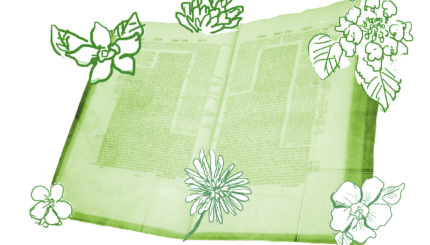We have already seen that the merit of mitzvot can delay divine punishment. And as we’ve just seen (and honestly could probably infer from our extended journey through the daf), for the rabbis, the greatest mitzvah is the study of Torah. On today’s daf, the Talmud explains the greatness of Torah study through a discussion of Proverbs 6:23, which states: “For the mitzvah is a lamp and the Torah is light.”
Rabbi Menahem bar Yosei explains how this brief verse contrasts lamps, by which he means artificial illumination, and light, by which he means sunlight, to explain a key difference between mitzvot in general and Torah study specifically:
The verse associates the mitzvah with a lamp and the Torah with light. The mitzvah with a lamp to say to you: Just as a lamp does not protect except temporarily, so too a mitzvah protects only temporarily.
And the Torah with light to say to you: Just as light protects one forever, so too the Torah protects one forever; and it states: When you walk, it shall lead you, when you lie down, it shall watch over you; and when you awake, it shall talk with you…” (Proverbs 6:22).

Help us keep Jewish knowledge accessible to millions of people around the world.
Your donation to My Jewish Learning fuels endless journeys of Jewish discovery. With your help, My Jewish Learning can continue to provide nonstop opportunities for learning, connection and growth.
“When you walk, it shall lead you” — this is this world. “When you lie down, it shall watch over you” — this is death. “And when you awake, it shall talk with you” — this is the time to come.
Rabbi Menahem reads the verse about light and lamps in connection with the verse immediately prior to it in order to argue that a mitzvah, like a lamp, protects the doer only briefly — since a lamp burns only as long as its source of fuel will allow. But Torah study, like sunlight, has much longer-term benefits. And just how long do those benefits extend? Well, like the sun, effectively indefinitely: The benefits of Torah study accrue in this life, in death and even in the World to Come.
That’s some heady stuff right there. But the Gemara next offers a parable that brings these ideas down to earth.
Compare this to a man who is walking in the blackness of night and he is afraid of the thorns, pits, thistles, wild animals and bandits — and he does not know which way he is walking. If a torch of fire comes his way, he is safe from the thorns, pits and thistles, but he is still afraid of the wild animals and bandits, and does not know which way he is walking. Once the light of dawn rises, he is safe from the wild animals and bandits, but he still does not know which way he is walking. If he arrives at a crossroads he is saved from all of them.
This parable paints an image of a man moving through the kind of darkness that was far more common in a pre-electric world, unable to see any of the dangers that might surround him. Mitzvot are like a torch, which offers crucial but limited protection from the dangers of the night, and the Torah is like the sun, which offers even more protection. Both provide some safety and psychological comfort, but neither solves every problem — only if he reaches a crossroads is he truly safe.
So what is the crossroads in this parable? The rabbis eventually offer a few possibilities:
Rav Hisda said: This a Torah scholar and his day of death.
Rav Nahman bar Yitzhak says: This is a Torah scholar with fear of sin.
Mar Zutra says: This is a Torah scholar who reaches conclusions from his discussion in accordance with the halakhah.
According to Rav Hisda, the crossroads is a Torah scholar who is dying (which, presumably atones for his sins). And surely death is, in some ways, the ultimate crossroads. For Rav Nahman bar Yitzhak, it is the combination of Torah study and fear of sin that is most protective. And for Mar Zutra, it is about pursuing Torah to the right conclusions — those that accord with divine law. (Which tacitly offers the fascinating acknowledgement that Torah study can potentially lead in wrong directions!)
Torah study, on today’s daf, is therefore likened to the sun as follows: It is widely and freely available, and a source of (effectively) limitless positive power in the world. But ultimately, like the sun, it only offers us the maximum benefit when we use it responsibly and for good.
Read all of Sotah 21 on Sefaria.
This piece originally appeared in a My Jewish Learning Daf Yomi email newsletter sent on April 19th, 2023. If you are interested in receiving the newsletter, sign up here.



